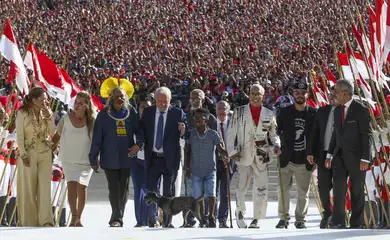Learn who the people who handed Lula his presidential sash are

One of the most anticipated moments of the presidential inauguration Sunday (Jan. 1) in Brazil—the handing over of the sash—moved everyone at the Três Poderes square in Brasília. As then-President Jair Bolsonaro flew out of the country shortly before the end of his term, expectations and speculation had flown high regarding who would be the person passing on the sash to Lula in the ceremony traditionally performed atop the ramp leading to the Planalto presidential palace.

Led by First Lady Janja da Silva, the team organizing the inauguration decided on a series of symbolic gestures. A group of eight people representing Brazilian society walked up the ramp alongside President Lula and vice-President Geraldo Alckmin. At the top of the ramp, the presidential sash was passed from hand to hand until it was handed to Lula by a black woman who works as a recyclable material collector. Among the group was a black child, a disabled person, an internationally recognized indigenous leader, and people who attended the permanent vigil during the 580 days Lula was imprisoned in Curitiba, in the southern state of Paraná, in 2018–2019.
The Brazilian citizens who ascended the palace ramp and brought the sash to Lula, Brazil’s 39th president, are:
Francisco Carlos do Nascimento is a 10-year-old black boy from the outskirts of São Paulo city. Like Lula, Francisco is a fan of Corinthians, a football team from his birth city. In 2019, the boy had been in Curitiba to attend the vigil staged by demonstrators calling for the release from jail of then former-President Lula, whom he had also met on another occasion in São Paulo. Having watched a feature film which tells the story of the president’s life, and with the attention and affection he received from the president at the Christmas ceremony held for waste pickers, Francisco says he can also become president of Brazil one day.
Aline Sousa, 33, has been a waste picker since she was 14, an occupation pursued by her family for three generations. Mother of seven, Sousa joined the National Waste Pickers’ Movement as national coordinator in 2013, representing waste pickers in the Federal District. She is currently head of the National Secretariat for Women and Youth of trash collectors’ association Unicatadores. Her task was to receive the sash from the others and place it on the new president’s shoulder.
Aged 90, Chief Raoni Metuktire dedicates his life to the defense of the Amazon and its indigenous people, and enjoys great recognition worldwide. Born in the Kraimopry-yaka village, he has traveled the world calling for peace.
Weslley Viesba Rodrigues Rocha, 36, has been a metalworker in São Paulo since he was 18. Rocha is married and has two children. He graduated in Physical Education with the help of student loan program FIES.
Murilo de Quadros Jesus, 28, is a teacher with a degree in Portuguese and English who lives in Curitiba. He has taught Portuguese as an additional language at the University of La Sabana, in Bogotá, Colombia, between 2016 and 2017 and was a Fulbright scholar as a Portuguese language professor at Bluefield College, in West Virginia between 2021 and 2022.
Jucimara Fausto dos Santos, a cook born in Paraná state, has dedicated her life to cooking and voluntarily contributed to the vigils while Lula was imprisoned in Curitiba.
Web influencer Ivan Baron is a young man from Rio Grande do Norte state, who has cerebral palsy. He is a famous voice in Brazil’s anti-ablesim movement online and is acclaimed as an ambassador of inclusion. Baron shares educational content about rights, fun facts, and relevant topics in a bid to make people with disabilities as well as the public at large better informed and more capable of fighting prejudice.
Flávio Pereira, 50, was born in Pinhalão, Paraná. He works as an artisan and also joined the Lula Livre (“Free Lula”) vigil during the 580 days of Lula’s imprisonment in Curitiba, helping in daily activities.





